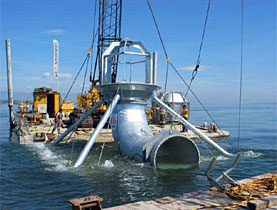Geneva inaugurates UN lake water project
Officials in Geneva have inaugurated a pioneering energy-saving project that uses lake water to cool and heat the city's United Nations buildings.
The thermal-exchange network will allow UN agencies and other international and non-governmental organisations to reduce carbon-dioxide emissions and conserve water.
“The UN has played a pioneering role,” said State Councillor Robert Cramer on Wednesday, adding that the SFr33-million ($30.3-million) project “symbolized Geneva’s commitment to renewable energies”.
The network should allow the UN to cut 2,000 metric tons of CO2 per year. Presently, it emits 5,500 tons annually.
The local power company, Services Industriels de Genève (SIG), has installed six kilometres of pipes from the lake to six buildings.
Ten buildings will be connected to the network by 2010, with a further 21 linking up by 2015.
The thermal exchange network uses water from Lake Geneva to cool and heat both new and existing buildings with a source of renewable sustainable energy.
Lake water 37 metres below the surface remains at a stable temperature of six to nine degrees Celsius year round. It is pumped two kilometres from shore, piped inland and shared with the local network.
For air conditioning, heat exchangers integrated into existing systems cool the piped water. Heating will be provided via modern, sophisticated heat pumps that produce hot water at 48 degrees Celsius, eliminating the need for energy-intensive boilers, burners, chimneys and fuel tanks.
The piped water will also be used to irrigate local parks and gardens, saving 400 million litres of drinking water per year.
swissinfo.ch and agencies

In compliance with the JTI standards
More: SWI swissinfo.ch certified by the Journalism Trust Initiative









You can find an overview of ongoing debates with our journalists here . Please join us!
If you want to start a conversation about a topic raised in this article or want to report factual errors, email us at english@swissinfo.ch.